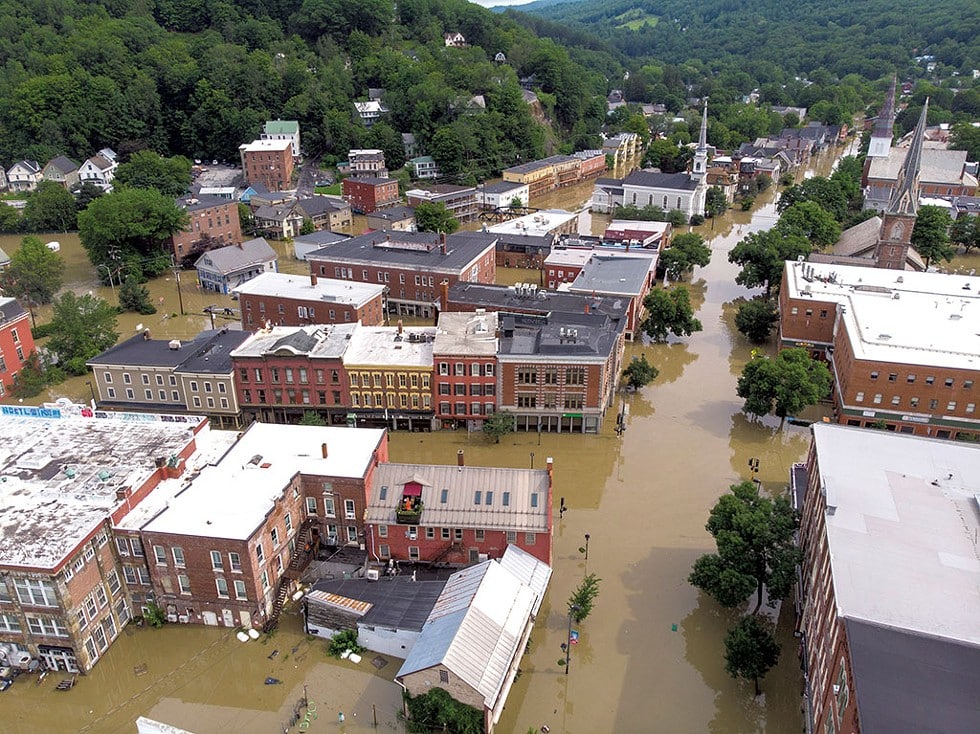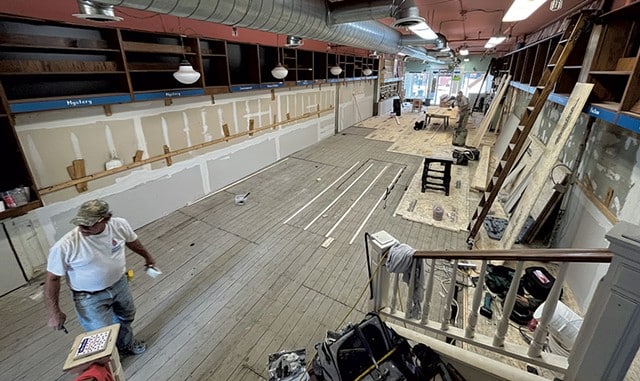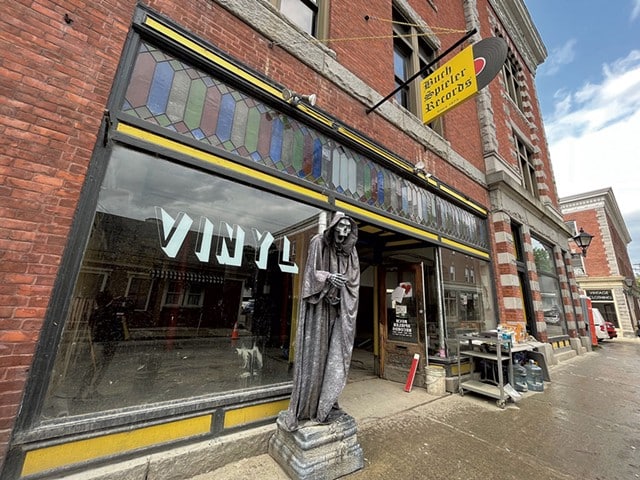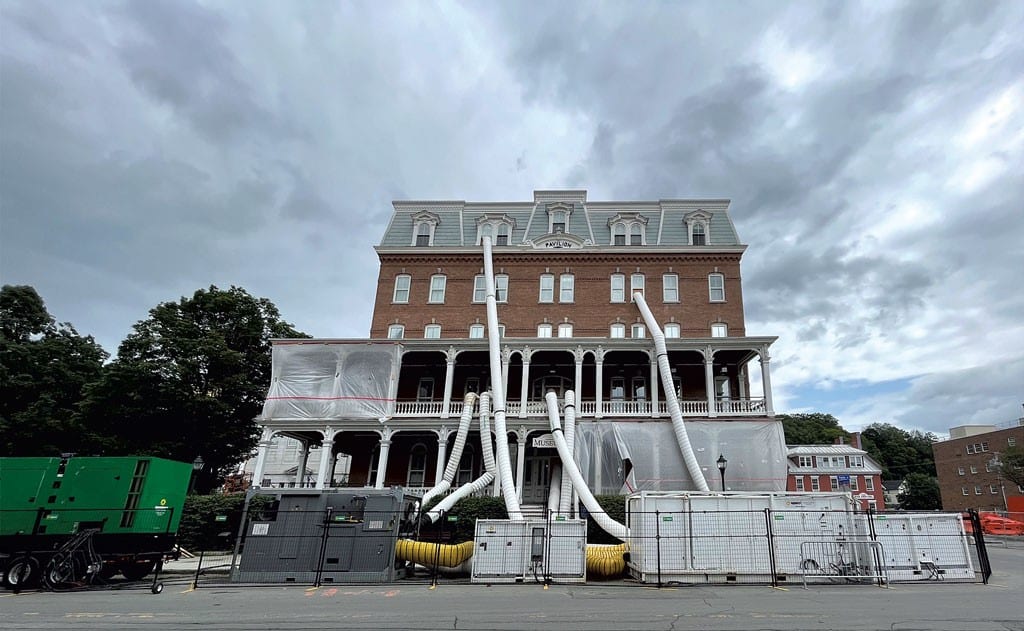The Flood Heard Around the World
Yankee editor Mel Allen reflects on the aftermath of catastrophic flooding Vermont, including a firsthand account from Montpelier from Seven Days publisher, Paula Routly.

Flooding in Downtown Montpelier, Vermont
Photo Credit : Jeb Wallace-Brodeur, Courtesy of Seven DaysNew England is the most compact region in the country. When you can drive from Rhode Island and Connecticut to Vermont or New Hampshire or Maine in a few hours, it feels that what people care about in one place, impacts many others in another. When a young lobsterman is lost in Maine on July 21, fishing communities in Gloucester also mourn. When farmers in the Pioneer Valley of Massachusetts lose nearly all their summer crops due to rain and flooding, when Vermont’s state capital is under water, we share in the devastation no matter where we call home.
This is the first of what will be my columns about what New Englanders are talking about. I will share recent stories from print and digital media that catch my eye and gave me insight into what makes this region unique. And I hope to also remind everyone how crucial reporters in towns large and small remain to our lives, to our knowing what matters here in New England.
– Mel Allen, Editor of Yankee Magazine
The Flood Heard Around the World | Vermont Flooding 2023
When rain began falling in torrents across Vermont on Sunday, July 9, and kept falling all day Monday, on top of weeks of near constant rain, everyone had flashbacks to when Tropical Storm Irene inundated the state in August 2011. The devastation then was considered the result of a once in a century rain. But only a dozen years later, Vermont again faced rivers overflowing their banks in nearly every corner of the state. The capital, Montpelier, was inundated by the Winooski River, and came with a foot of even more devastation when the swollen river seemed about to breach the dam that had long protected the small city.
The weekly Seven Days called all hands on deck to cover the story of a natural disaster that upended all normal life. And it continued to tell the story as Vermonters refused to buckle, and again, found the resolve to rescue neighbors, to establish safe places, and to clean up afterwards, shoulder to shoulder. Seven Days coverage, as always, is available for anyone, anywhere. No pay walls on the website. It stays alive with advertising and donations from grateful readers.
The story this summer throughout New England has been the effect of climate change on everyday life; farmers seeing crops ruined, hay fields unusable for animals, and, towns under water with the July deluge. One of the most affecting and telling stories about the flood was this column by Seven Days publisher, Paula Routly. In her words and her photos, she tells about what it was like to go to Montpelier on what would normally be a good news mission: celebrating the businesses readers had chosen as “Best” outside of Chittenden County, home to Burlington. Her account revealed both devastation and indomitable spirit.
Here is an excerpt from the piece Routly wrote for Seven Days:
Like almost every downtown Montpelier storefront that was inundated in last month’s flood, Bear Pond Books is closed until further notice. Approximately 3,000 sodden books have been cleared out of the retail space near the corner of State and Main streets, along with piles of fixtures and furniture accrued over its 50-year life. On Monday a construction crew was hard at work installing a new floor and the bottom sections of the walls.
“We moved things up, but not high enough,” co-owner Claire Benedict said, noting that the water level peaked at 3.5 feet on the first floor. No books were in the basement at the time of the flood.

Photo Credit : Paula Routly, Courtesy of Seven Days
Three weeks after the deluge, Benedict still looked a little stunned. Tired, too, as she and her partner, Rob Kasow, consider a daunting to-do list. For example: Finding replacement bookshelves, which Benedict sourced in New Jersey, was difficult and expensive. They’re on the way to a projected Labor Day Weekend reopening.
“After the pandemic, I thought I was done with disasters,” Benedict said with a sigh.
I went to Montpelier bearing news that, under normal circumstances, would likely have cheered them up. Seven Days readers selected Bear Pond as the best bookstore outside of Chittenden County in our annual Seven Daysies competition — as they’ve done a dozen times in the past 20 years.
Benedict cracked a weak smile. “We’re not coming to the party,” she said of the annual celebration on Friday at Burlington’s ECHO Leahy Center for Lake Champlain, at which we honor contest winners, finalists and advertisers in 234 categories. “We’re, like, the least enthusiastic Daysie winners alive.”
Sadly, they’re not the only preoccupied winners in town. Around the corner is Julio’s Cantina, voted best Mexican restaurant outside of Chittenden County. The interior of the State Street eatery is unrecognizable except for the bar.
A short walk from Julio’s is the gutted storefront of Onion River Outdoors, voted best bike shop outside of Chittenden County. At the time of the flood, the basement was full of merchandise, according to the landlord, Lucky Boardman, who recently bought the building on Langdon Street.
Across from it, a life-size grim reaper — or is it the Ghost of Christmas Future? — stands sentry in front of an emptied-out Buch Spieler Records, a finalist for best record store. The statue perfectly captures this eerie moment in Capital City history.

Photo Credit : Paula Routly, Courtesy of Seven Days
But Montpelier is far from dead and, in time, will be ready to embrace a more hopeful metaphor: Simple, ubiquitous and perennial, a daisy blooms in all conditions, including adverse ones. Last year’s best-of contest and party were a love fest for the businesses we cherish — and almost lost — in the pandemic.
Putting up a shingle in Vermont might look easy. But in this rural, sparsely populated state, it’s not. Good thing there are other measures of success: how many customers show up to help you move books to higher ground before a flood; the number of strangers who contribute to your GoFundMe campaign; the miracle of readers paying for a free newspaper to keep it going. Benedict said authors from all across the country have been sending money to Bear Pond and ordering books through its still-operational online store.

Photo Credit : Paula Routly, Courtesy of Seven Days
Last Saturday, 18 Vermont members of the New England Independent Booksellers Association donated 20 percent of their sales to the bookstore and to another one in Barre, Next Chapter, that also flooded. Benefactors include all three Phoenix Books locations, Vermont Book Shop in Middlebury, Shelburne’s Flying Pig Bookstore and Yankee Bookshop in Woodstock.
In a comparable act of magnanimity, the best nonprofit in this year’s Daysies contest, the Humane Society of Chittenden County, is giving the cash portion of its award — money from Daysies party ticket sales — to the Vermont Community Foundation’s VT Flood Response and Recovery Fund. We’re helping the Humane Society by gifting them the same amount in free advertising.
“Thank You Everyone,” reads the message plastered across one of the front windows at Bear Pond. “Recovery is just getting started. Please continue to help.” That goes for all of us.
How to Help:
- The Vermont Community Foundation has organized the VT Flood Response & Recovery Fund 2023 for flood-specific donations.
- You can give financial assistance to the Vermont Main Street Recovery Fund, which will issue grants to small businesses affected by the floods.
- State officials are also encouraging support of the American Red Cross of Northern New England and local United Way chapters.
Mel Allen
Mel Allen is the fifth editor of Yankee Magazine since its beginning in 1935. His first byline in Yankee appeared in 1977 and he joined the staff in 1979 as a senior editor. Eventually he became executive editor and in the summer of 2006 became editor. During his career he has edited and written for every section of the magazine, including home, food, and travel, while his pursuit of long form story telling has always been vital to his mission as well. He has raced a sled dog team, crawled into the dens of black bears, fished with the legendary Ted Williams, profiled astronaut Alan Shephard, and stood beneath a battleship before it was launched. He also once helped author Stephen King round up his pigs for market, but that story is for another day. Mel taught fourth grade in Maine for three years and believes that his education as a writer began when he had to hold the attention of 29 children through months of Maine winters. He learned you had to grab their attention and hold it. After 12 years teaching magazine writing at the University of Massachusetts-Amherst, he now teaches in the MFA creative nonfiction program at Bay Path University in Longmeadow, Massachusetts. Like all editors, his greatest joy is finding new talent and bringing their work to light.
More by Mel Allen

